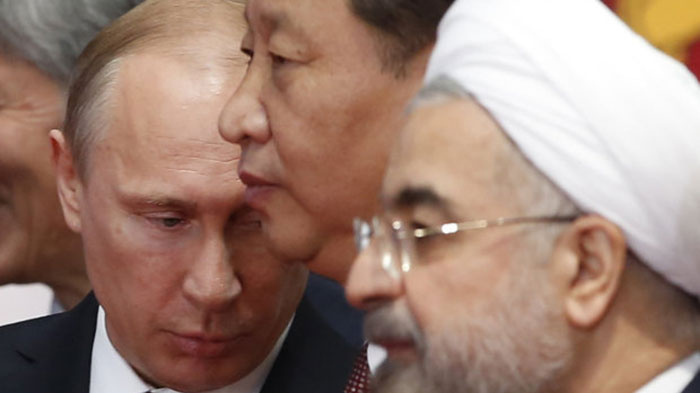To break Iran nuclear deal, Trump may have to break through cement

This week, Iranian Defense Minister Brigadier General Hossein Dehqan and his Chinese counterpart General Chang Wanquan inked an agreement in Tehran to boost defense-military cooperation, transfer training experience, fight terrorism and factors of insecurity in the region.
Russia and Iran have been negotiating the supply of $10 billion worth of weapons and hardware to Tehran following the successful delivery of Russia’s S-300 air defense missile systems to the country in October, the head of the defense and security committee of the Russian upper house of parliament, Viktor Ozerov, told reporters on Monday during a visit to Iran. He also raised the possibility that Russia could resume talks to use Iran’s Hamadan airbase again.
Obviously, these reports have attracted attention, internationally and domestically. Washington Post’s Brian Murphy calls the announcements “an early lesson to the Trump administration on the slippery reality of the world”:
One maxim Trump will quickly learn: Washington now has very limited power to isolate and punish Iran. Trump may be able to follow through on pledges to tear up the U.S. portion of last year’s nuclear deal … but that leaves America’s other five negotiating partners, including Russia and China, sticking with the program and making deals with Iran.
Iranian media outlets have also noticed the significance of the deals, trying to seek commentary from experts immediately available. Syrian lawmaker Ibrahim al-Mahmoud has told Tasnim News Agency that the agreements send serious signals to the United States.
“This indicates the rise of two global poles, one with the US and NATO standing on the one side and the other being BRICS. Iran has powerfully joined the latter, especially after the US Democrats lost to Trump,” Tasnim quoted him as saying.
Paul Pillar, former chief of analysis at the CIA’s Counterterrorist Center, has told Mehr News Agency that US relations with Iran may follow the same logic Trump intends to pursue regarding ties with Russia.
Fararu quotes from Want China Times’ interview with an unnamed Russian military analyst who believes Russia needs a union with Iran and China after the Ukraine crisis in order to be able to resist the United State and NATO. “If Russia could pursue serious ties with China, a security system could be established to challenge US' global influence,” the analyst said. The translated version of the argument goes on by emphasizing that Shanghai Cooperation Organization has shown that the two countries have the ability to unite Asian countries around a new regional order. As for the role Iran can play, the Russian analyst points out to the Conference on Interaction and Confidence-Building Measures in Asia where Iran could act as a barrier against US influence in the Middle East.
Mohsen Shariatinia, assistant professor at Shahid Beheshti University, views the recent Sino-Iranian developments in the light of what he calls the future of Iran-China-US strategic triangle. “Over the past four decades, the US role in formulating the direction [of Sino-Iranian ties] has been instrumental, rendering them trilateral instead,” he writes in an op-ed for Iranian Diplomacy. The role of the United States, once a catalyst before the Islamic Revolution, has transformed multiple times, particularly in the past decade, mainly in sabotage and restrictions. The nuclear deal, however, has once again transformed the role, easing the country’s pressure on Sino-Iranian ties, Shariatinia argues. He points out the trio’s cooperation in renovation of Arak reactor and a Chinese President’s visit to Iran after 14 years, as signs of a gradual shift toward mutualization and normalization of ties between the two countries. Here intervenes the United States once again. Trump presidency could be a return to future, Shariatinia quips. He then takes into account some likely scenarios Trump may adopt regarding Iran and their impact on ties between Iran and China. “With the deeply obscure transformation in the US, Sino-Iranian ties are once again on the threshold of a kind of paradigm change. The two have no choice but to hope for the best and prepare for the worst,” he concludes.
Russian political analyst Maria Pakhomova says in an interview with Sputnik that Beijing is assigning Iran one of the key roles in the geopolitical game in the Middle East. Pakhomova, an expert from the Institute of Oriental Studies of Russian Academy of Sciences, noted China’s intensified diplomatic efforts in Syria, mirrored in the appointment of Xie Xiaoyan, former ambassador to Iran, as the Special Envoy of the Chinese government on the Syrian issue. His appointment serves as an apparent demonstration that China is assigning Iran one of the key roles in the geopolitical game in the Middle East, she said.
She goes on saying Tehran is playing the "China card" with the help of the military contacts. “China possesses a very powerful military potential, including its Naval Forces. Thus Iran is interested in boosting military cooperation with China, including military drills in the Persian Gulf," she told Sputnik.
After the nuclear deal with world powers, Iran has sought to cement trade and security ties with various partners, from east to west, as a way to guarantee its status regardless of threats posed by the United States. With Trump in office, partnerships should accelerate in order to make it more difficult for the new US president to isolate Iran.

